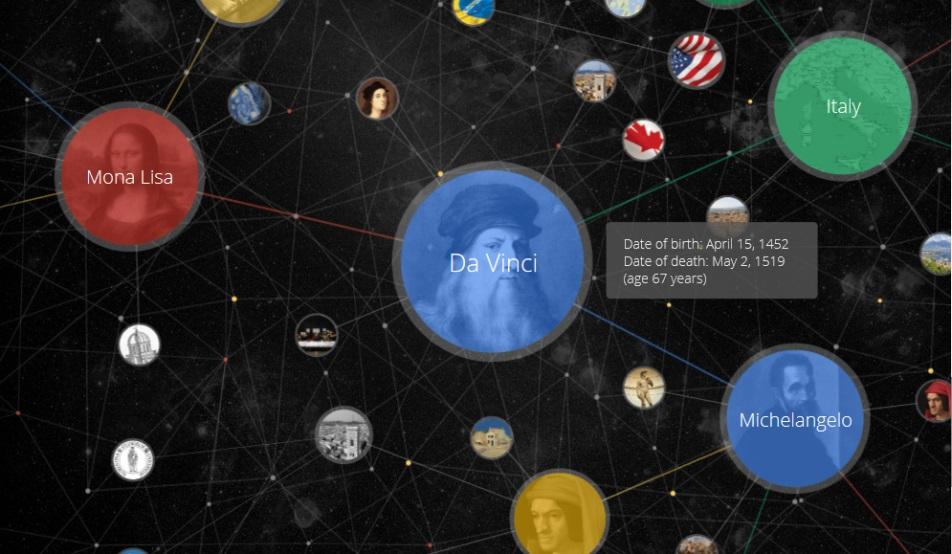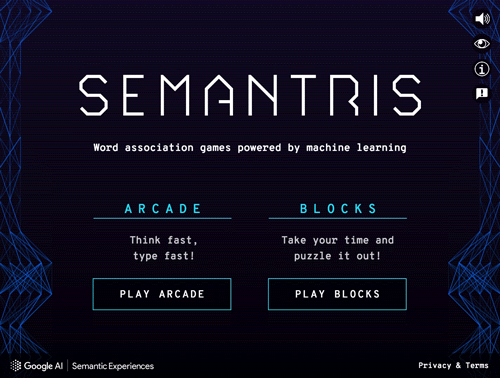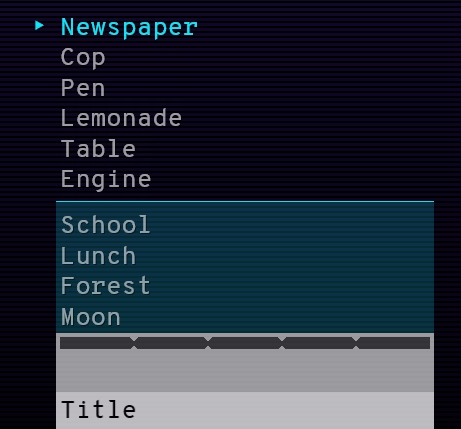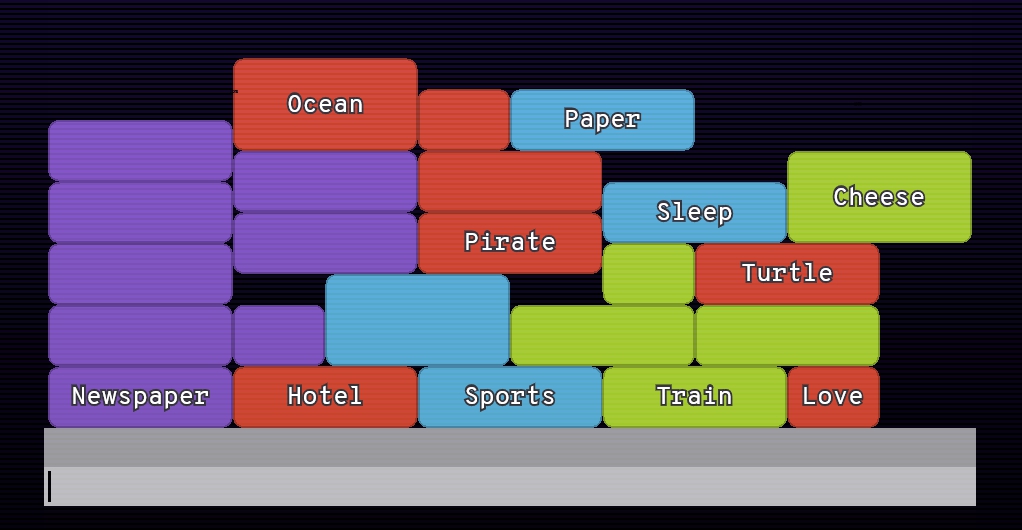
In 2016, Will Knight, an artificial intelligence researcher at the Massachusetts Institute of Technology, wrote that “Machines that understand natural languages would be extremely useful. But we don't know how to create them. "
Much has changed since then. Artificial intelligence effortlessly beats the grandmasters of go, shogi and chess, Google Translate is successfully developing using a self-learning neural network, and Yandex's voice assistant Alice recognizes human language well and quite naturally imitates live speech.
But can a machine really understand natural languages? Google is confident that it can. In December 2019, based on neural networks, they created a small word game in which AI operates not just with the meanings of individual words, but with whole chains of associations.
Meet Semantris. Today we'll talk about it and think about whether AI knows English enough to help people learn it.
Semantris - a game against AI
It's better to try once than read the description ten times. To understand what we are talking about, we advise you to immediately evaluate the game yourself.
Play Semantris

It can be played in two ways: as an arcade game and as a kind of bricks.
Arcade
Here is a column of words in English, one highlighted. Your task is to come up with an association for it that will be higher in the rating of associations of the system itself than for all other words in the column.
It sounds complicated, so it's better to use a visual example right away.

The key word now is "Newspaper".
You need to come up with an association that fits this particular word, but not the others in the column. Be careful, there are also the words "pen", "school" and "table", which are in the same semantic field with the word "newspaper".
Let's say you come up with the "Title" association.

And she turned out to be the best, so you get the maximum points.
If suddenly some other word from the column is closer to the association that we came up with, the player will receive fewer points. And if the association is unsuccessful at all, then a fine.
To stimulate the speed of the player's thinking from above, new words are constantly falling. If you think too much, then the word tower will reach the top of the screen and there will be "Game over".
Bricks

Here, too, you need to come up with associations, but the order of the game changes slightly. You write a word, and the game itself figures out which association on the playing field is closer to it.
When an association is selected, the game removes the block with this word and all blocks of the same color that are next to it.
Let's say you write the word Ship.
There are two words on the playing field that are close to it in association: Ocean and Pirate. Which one will the system choose?

This is "Ocean". According to the AI, the "ship" is closer to him, and not to the "Pirate".
Here you need to include strategic thinking and control the entire situation on the field - like in chess. After all, if you make a mistake, the system will remove the wrong block that you need. This will complicate the situation on the field, because additional blocks fall from above every turn.
Once the pyramid reaches the top, you lose.
The games are very simple but addictive. You even forget that you are playing with artificial intelligence, which processes requests in real time. You can even use words and phrases that are not in dictionaries.
For example, if you write “RPG” in the association for the word “Game”, the system will designate this as a perfect match. After all, it really is. RPG is one of the genres of computer games, which stands for "Role-playing game". In a fully scripted game, such an association would not exist - she would have taken the RPG abbreviation as an erroneous spelling and simply would not have counted a point.
How Semantris Works: A Look Inside
Semantris uses a fully trainable end-to-end algorithm that works with a variety of natural languages. This means that the neural network independently builds models for working with tokens.
Specialists provide open access to system algorithms. Anyone can download them and dig in the insides.
Initially, the neural network was trained on examples from natural languages, where for each sentence, phrase or word a translation, meaning or other semantic connection was given in advance, for example, an implication or a question-answer pair.
, « ?», «, ». — , . - . « ? — « 90 ».
, -, . .
During the training, semi-supervised data sources are used - the so-called transductive learning.
Using a large number of sources (articles from the media, threads on forums, databases of questions and answers), the neural network learns to operate with phrases and sentences in different dimensions: semantic consistency, semantic similarity, general meaning and even semantic patterns.
The neural network was trained in English, but the methodology can be used for any natural language.
The system learns from complex examples, therefore it simultaneously learns the syntax, semantics and meanings of words. Working with associations is just one of the many possibilities of a neural network.
AI play helps you learn English
Now let's look from the perspective of learning English. Semantris is a real find. These two mini-games help you solve real-life learning problems.
To play Semantris, you need an English level of at least Intermediate with a vocabulary of 2000 words or more. After all, the game does not help to learn new words - it helps to use the already known ones.
If your vocabulary is not enough, we recommend downloading the ED Words app and learning up to 10 new English words every day.
In addition, it is important to know the correct spelling of words - the system does not recognize misspelled words. T9 is not here, so even if the association is perfect, you will still get a penalty due to the error.
Interestingly, these mini-games solve very different problems, and yet both are damn useful for a variety of learning experiences. Let's analyze it separately.
*** The
main value of the arcade is speed. New words are constantly falling from above, so you need to come up with associations quickly, within a few seconds.
Interestingly, the game takes into account the difficulty level. At first, you come across simple words that are learned already at the elementary level. For example, "kitten", "pond", "garden", "rain". But the further, the more difficult. In a minute and a half, the semantic field increases, and the phrases become more complex. It is quite difficult to find an association for "nuclear power" or for "Stonehenge" in a second - I have tested it myself.
Adding complexity is that you cannot use the same root words. That is, if you have “Stonehenge” on the screen, the game will not accept the word “stone”.
From a learning perspective, this is a great example of activating passive vocabulary. In moments of playful concentration, the brain digs out associations that you simply would not have thought of in "normal mode". Moreover, the game will be useful for any level of knowledge, up to the level of a native speaker.
***
In the game of bricks, it is much more important to think through the associations. After all, you write a word in the input line, and the system independently selects the one that is closest to it on the playing field.
That is, you don't know in advance which word the AI will choose. And when a tower of blocks approaches the upper border, it is very important to "knock out" the correct bricks.
Therefore, you have to take into account all the words that are on the field at once.
For example, the field contains the words "water" and "fish". If you write "pond", then you cannot predict which word the system will choose. Because “pond” is equally well associated with “water” and with “fish”. Therefore, it is worth trying another association. And if you write "salmon", then with almost 100% probability the AI will choose the word "fish" on the field.
It turns out that the player needs to understand the meanings of all words on the field and try to come up with an association that will be close to one word, but far from others.
The player must think strategically, because it is important not only to remove blocks, but also to evaluate exactly how they will fall on the next turn.
And as the complexity increases, it becomes extremely difficult to predict associations. How, for example, can you come up with a precise association to the movie "Stairway to Heaven" or the group "Pink Floyd"? After all, the associative array of an entire full-length film and the work of a musical group is an order of magnitude more complicated than the semantics of a single word.
***
Semantris is a great opportunity to diversify your English learning. Both games are interesting, you can easily get stuck in them for half an hour or an hour. At the same time, they are extremely simple, even a child will understand the rules, but they are useful for learning a language.
As an additional tool for practicing - gorgeous. But do not forget what exactly is additional.
Using Semantris does not negate the need for instructor-led sessions, grammar practice and new vocabulary learning. But for a change, this is exactly what you need. Both fun and useful. Enjoy learning English!
Online school EnglishDom.com - we inspire to learn English through technology and human care

Only for Habr readers, the first lesson with a teacher on Skype is free ! And when buying classes, you will receive up to 3 lessons as a gift!
Get a full month of ED Words premium subscription as a gift .
Enter the semantris promo code on this page or directly in the ED Words app . The promo code is valid until 09/25/2021.
Our products:
- Learn English words in the ED Words mobile app
- Learn English from A to Z on the ED Courses mobile app
- Install the extension for Google Chrome, translate English words on the Internet and add them to study in the Ed Words app
- Learn English in a playful way in the online simulator
- Strengthen your speaking skills and find friends in conversation clubs
- YouTube- EnglishDom